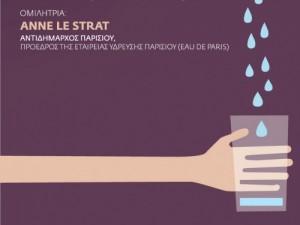
This week we released the second spot of the campaign SAVEGREEKWATER ” SOMETHING ‘S UP WITH THE WATER” entitled ” Watering “. Campaign has involved pro bono participation of more than 250 people and there are filmmakers and artists that have expressed interest to participate and support with other spots in the future this collective effort for our most valued common good. This week’s spot referring to Portugal was released along with important news from the Portuguese Court of Auditors showing that the reference in the Portuguese case in the video is nothing but an exception.
An investigation by the Court of Auditors has uncovered the true consequences of private management of the water sector: private companies pocket hefty profits whilst residents and local authorities are left to pick up the bill.
A report published on 27th February by the Portuguese Court of Auditors into Public Private Partnerships (PPPs) in the water sector vindicates STAL’s (The National Union of Local and Regional Government Workers of Portugal) ongoing struggle to expose the consequences of privatizing public services in the water and sanitation sector. It shows how detrimental these deals are both for local authorities and ordinary citizens, who are forced to pay all the costs whilst private companies pocket hefty profits.
All 19 local concessions looked at by the court (Alcanena, Barcelos, Batalha, Campo Maior, Carrazeda de Ansiães, Figueira da Foz, Fundão, Ourém, Trancoso, Gondomar, Setúbal, Paredes, Valongo, Fafe, Santa Maria da Feira, Matosinhos, Santo Tirso/Trofa, Paços de Ferreira and Marco de Canaveses) demonstrate an unequal sharing of liability that clearly benefits private service providers, to the detriment of local authorities.
In most of the contracts, the “projected growth rates in population and water use, that serve as the basis for the contracts, are inaccurate and removed from the real situation on the ground.” The lack of oversight is such that “these projections were provided and approved by the relevant local authorities without having been audited or reviewed prior to the contracts being signed.” To make matters worse, the report shows that three in every four of the agreements guarantee compensation to the private service provider if there is a drop in water use or in number of consumers.
The report makes specific mentions of one decision by the Arbitration Court that awarded substantial payments to two private operators. The local council in Marco de Canaveses was forced to pay the private service provider, Águas do Marco, €18 million in compensation. Similarly, the local authority in Barcelos was made to pay Águas de Barcelos nearly €172 million in installments over the period of the contract. This sum is nearly three times the council’s entire budget.
The profit margins are truly obscene, ranging from 9.5% to 15.5%. The Court states that “this level of expected shareholder dividend is unacceptable in light of current fiscal and budgetary constraints.” It recommends a downward revision of profit margins that are above 10% “as a consequence of changing circumstances and for reasons of fundamental public interest.”
The court’s recommendations also conclude that “the public sector licensers showed serious limitations with respect to their capacity for the financial monitoring and the risk assessment of these contracts, resulting in deficiencies in the technical and business skill set that is needed to safeguard the financial interests of local authorities and consumers.” This confirms STAL’s position that local authorities would be easily subordinated to the interests of powerful economic groups.
In the Court’s opinion, the defects in existing water legislation that are discussed by the report penalize local authorities and benefit private service providers, highlighting successive governments’ policies of enshrining protection for provide profit in law.
Equally telling is the auditor’s confirmation that “the regulatory authority has only carried out eight audits, which corresponds to 30% of total concessions, leaving much to be desired in terms of compliance with contractual obligations on the part of both licensers and concessionaires.”
According to STAL, it is damning that this audit has only now be carried out now, some twenty years after the first water privatization in Portugal and that it is vital to lay the groundwork to bring privatised water and sanitation services back under public control, to do away with these abusive and illegal contracts and to hold all those responsible to account.
Also, it turns out that it is not enough to have legal and regulatory supervision in order to avoid failures and mismanagement on the part of private companies whose only motive is to make as much profit as possible.
Portugal is another case of a country where private water providers have shown their real face. That is why we all act in time to avoid Greece becoming after a few decades an example to avoid.
And as for any excuses, we recall that Olli Rehn has said that privatization in Greece is the Greek government’s decision and not its creditors and that it agrees to exclude water services from the Agreed.
The will of the people should be enough to be respected by an elected government, but here we have on top the official acceptance of the lenders.
And yet some representatives of all of us persist in error. It is worth wondering why.




